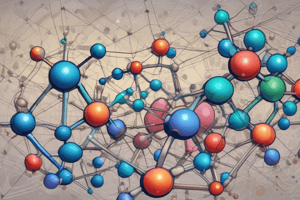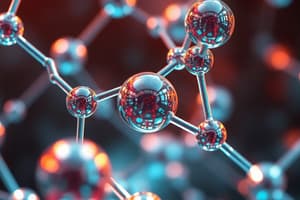Podcast
Questions and Answers
Что такое неорганическая химия?
Что такое неорганическая химия?
- Раздел химии, изучающий исключительно углерод-содержащие элементы и соединения
- Раздел химии, изучающий все виды химических реакций и процессов
- Раздел химии, изучающий неуглеродные элементы и соединения (correct)
- Раздел химии, изучающий только металлы и их соединения
Какие ключевые концепции изучает неорганическая химия?
Какие ключевые концепции изучает неорганическая химия?
- Только неметаллы и их соединения
- Физические свойства веществ и их взаимодействие
- Только металлы и их ионы
- Металлы, металлоиды и их соединения, а также кислоты, основания и соли (correct)
Что характеризует металлы?
Что характеризует металлы?
- Способность терять электроны и образовывать положительные ионы (correct)
- Способность легко окисляться и участвовать в реакциях восстановления
- Способность образовывать ковалентные связи с неметаллами
- Все вышеперечисленное
Какую роль играют металлические ионы в химических реакциях?
Какую роль играют металлические ионы в химических реакциях?
Какие элементы относятся к неметаллам?
Какие элементы относятся к неметаллам?
Как обычно ведут себя неметаллы в химических реакциях?
Как обычно ведут себя неметаллы в химических реакциях?
Какие соединения называются солями?
Какие соединения называются солями?
Что такое координационные комплексы?
Что такое координационные комплексы?
Что описывает концепция октетного правила в координационных комплексах?
Что описывает концепция октетного правила в координационных комплексах?
Какая из следующих областей исследований в неорганической химии связана с созданием новых функциональных материалов?
Какая из следующих областей исследований в неорганической химии связана с созданием новых функциональных материалов?
Какая область исследований в неорганической химии связана с катализом и хранением энергии?
Какая область исследований в неорганической химии связана с катализом и хранением энергии?
Какая область исследований в неорганической химии связана с разработкой экологически чистых технологий?
Какая область исследований в неорганической химии связана с разработкой экологически чистых технологий?
Flashcards are hidden until you start studying
Study Notes
Inorganic Chemistry: A Deep Dive into the Subfield of Chemistry
Introduction
Inorganic chemistry, a broad and diverse subfield of chemistry, encompasses the study of non-carbon containing elements and compounds. This discipline focuses on understanding the structures, properties, and reactions of inorganic species, ranging from simple ions like hydroxide and sulfurate to complex polymers like zeolites and clays. Inorganic chemistry also investigates metals, metalloids, and their various forms, including salts, acids, and bases. This article provides an overview of inorganic chemistry, its key concepts, and relevant research topics.
Key Concepts in Inorganic Chemistry
Metals and Metal Ions
Metals are a class of elements characterized by their ability to lose electrons and form positive ions called cations. Common metals include alkali metals (e.g., lithium, sodium), alkaline earth metals (e.g., magnesium, calcium), transition metals (e.g., iron, nickel), and noble gases (e.g., helium, neon). Metal ions play crucial roles in various chemical reactions, often serving as catalysts or participating in redox processes.
Non-Metal Elements and Compounds
Non-metals include elements like hydrogen, carbon, oxygen, and halogens. They typically form negative ions called anions and participate in acid-base reactions and electron transfer processes. Inorganic compounds formed between metals and non-metals are known as salts, while those involving only non-metals are called compounds. Examples of inorganic compounds include oxides (e.g., water, CO2), halides (e.g., NaCl), sulfides (e.g., ZnS), and nitrides (e.g., ammonia, NH3).
Coordination Complexes
Coordination complexes are compounds composed of a central metal ion bonded to various ligands, which can be molecules, ions, or atoms. These complexes exhibit unique properties and play essential roles in biology, medicine, and catalysis. The Lewis structure of coordination complexes is described through the concept of octet rule, where each atom strives to attain a full complement of valence orbitals.
Research Topics in Inorganic Chemistry
Synthesis of New Inorganic Compounds
The discovery and creation of novel inorganic compounds continue to expand our understanding of fundamental principles governing chemical bonds and interactions. Researchers aim to explore new synthetic routes and identify unexplored chemical spaces that lead to novel functional materials. Some exciting research topics involve creating advanced materials based on metallocenes, metal-organic frameworks (MOFs), and polyoxometalates.
Reactivity and Properties of Transition Metal Clusters
Transition metal clusters exhibit remarkable properties due to their size-dependent electronic configurations. Investigation into the reactivity and properties of these clusters can lead to advances in catalysis, energy storage, and sensing. Research topics include understanding reaction pathways, exploring new spectroscopic techniques, and designing efficient catalysts for industrial applications.
Environmental Applications of Inorganic Species
Understanding the environmental impact of inorganic species is crucial for developing sustainable solutions. Research topics focus on the removal of pollutants from air, soil, and water, employing reactive species like ozone, hydroxyl radicals, and superoxide. Another area involves studying the fate and transport of inorganic contaminants in aquatic environments, with the ultimate goal of reducing their ecological risk.
Inorganic Chemistry in Medicine and Pharmacology
Inorganic chemistry plays a pivotal role in drug development, delivery, and diagnostics. Research topics include the development of new drugs based on inorganic compounds, the investigation of metal-ligand interactions in pharmaceuticals, and the design of targeted drug delivery vehicles. Additionally, inorganic species have been found to possess antimicrobial properties, making them attractive candidates for antibacterial coatings and treatments.
Challenges and Future Directions in Inorganic Chemistry
As our knowledge of inorganic chemistry grows, researchers face new challenges and opportunities. These include the exploration of new reaction conditions, the development of advanced characterization tools, and the integration of computational modeling and machine learning algorithms into experimental workflows. Furthermore, recent advancements in the fields of molecular dynamics simulations and quantum chemistry have opened avenues for predicting the properties and behaviors of inorganic species.
In summary, inorganic chemistry offers a wealth of opportunities to explore the vast landscape of elemental and compound interactions. From understanding basic principles to developing advanced materials and technologies, the subfield of inorganic chemistry continues to drive innovation and discovery in the broader realm of chemical sciences.
Studying That Suits You
Use AI to generate personalized quizzes and flashcards to suit your learning preferences.




